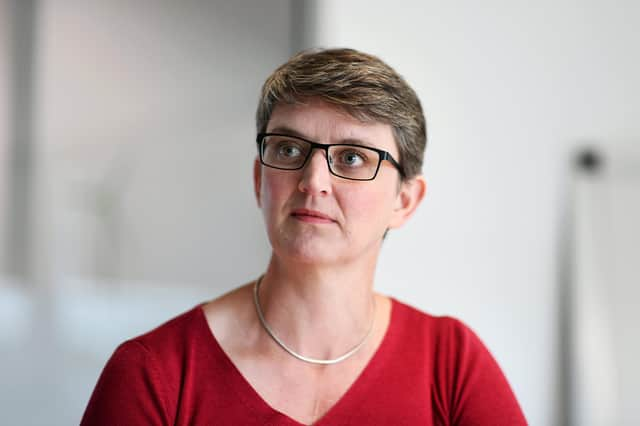Readers Letters: 'Conversion therapy' terms is what's really confusing


But should it not also apply to those who have made it their mission to encourage children to question their “gender” to the extent of denying their biological sex? The Green list MSP Maggie Chapman believes that children may “know” from the age of six that they are of a different “gender” from that recognised at birth. Some children who are persuaded of this submit themselves to cruel and unusual practices such as puberty blockers, and even disfiguring and irreversible surgery.
If conversion therapy means anything, surely it should also be applied to those who encourage these actions?
Jill Stephenson, Edinburgh
Book a van
Advertisement
Hide AdAdvertisement
Hide AdFor many, often hotly debated, reasons, council budgets are among many being squeezed until the pips squeak, and sadly the public library service is an easy target. This service in Moray has suffered steady cutbacks over the years until the only remaining, now decrepit, mobile library van is due for retirement.
For many years the mobile library drivers have gone out in all weathers to schools, sheltered accommodation, and people in remote areas who are unable to access the main library. The drivers have encouraged autistic children, given cheer to the lonely and troubled customers, provided learners with research and given practical support to many clients. Community connections, human interactions, information, support and service to many otherwise isolated people have been invaluable. This community service is only appreciated by those who really need it, many of whom are not internet or computer savvy.
One proposed replacement system using volunteers will require much more effort in organising, vetting, training and insurance cover. Another suggestion is for “pop-up” libraries in rural areas. This would require a cost of site hire as well as creating health and safety concerns for the individual required to unload and then reload boxes of books into the transport being used.
Surely a new mobile library van would be the simple long-term solution?
Sadly, none of the unquantifiable benefits of this service can appear on a balance sheet and are discounted, so the quality of life for many of the less fortunate will deteriorate further. All that is needed is a new library van.
Jenny Main, Elgin, Moray
Energetic debate
Ian Moir states Humza Yousaf’s claim that Scotland has “extraordinary resources” such as higher education and renewable energy “does not stand up to economic analysis” (Letters, 10 January).
Mr Moir mentions a cut in “the cash for tertiary education for the second time”. With the UK Government’s austerity economics policies deliberately reducing public spending since 2010, expenditure only being cut twice in Scotland despite this is an amazing achievement.
He says “just over 50 per cent of students attending Scottish universities are home based compared with 74 per cent south of the Border”. However, 2021 statistics show 72.2 per cent of pupils in Scotland continuing in education. If almost 50 per cent of students are not home based that is not due to low numbers of home-based students but due to high numbers of foreign students attracted by the internationally recognised high standard of Scottish education, with three of Scotland’s universities in the top 100 in the world. So our higher education does seem to be an “extraordinary resource”.
Advertisement
Hide AdAdvertisement
Hide AdRegarding energy, according to National Grid statistics up to 3.5 gigawatts of electricity can be transferred between Scotland and England, 90 per cent going from Scotland to England, closely related to wind production. There are also proposals for a power line from East Lothian to County Durham. Eastern Green Link’s website indicates “EGL1 – Will be able to transport up to 2GW of renewable energy from Scotland’s rich renewable energy reserves, particularly offshore wind, to consumers in the rest of the UK. That’s enough energy for two million homes.” This surely indicates Scotland’s renewable energy is an “extraordinary resource”.
Sadly, energy being a matter reserved to the UK Government, it is not being used to the maximum benefit of Scotland. Also, being an internal transfer between UK nations it does not show up in Scotland’s financial export figures.
Jim Stamper, Bearsden, East Dunbartonshire
Mayans demise
Climate change sceptics too often rely on their own opinions rather than investigating the actual evidence. In his criticism of Richard Dixon (Letters, 12 January), Neil Bryce notes climate has varied in the past, something most people accept, but then damages his credibility by telling us that the Mayan civilisation was wiped out 2,000 years ago by a series of devastating droughts.
In fact, its demise occurred 1.700 years later, not because of climate change but with their final defeat at the hands of the Spanish invaders in 1697.
Barry Hughes, Edinburgh
Ode to Nightingale
Farewell to DJ Annie Nightingale, who educated generations with her eclectic tastes in music. Those pleasing her ear seldom become household names, but most are still going strong while their contemporaries quickly ran out of steam decades earlier.
Mark Boyle, Johnstone, Renfrewshire
Write to The Scotsman
We welcome your thoughts – NO letters submitted elsewhere, please. Write to [email protected] including name, address and phone number – we won't print full details. Keep letters under 300 words, with no attachments, and avoid 'Letters to the Editor/Readers’ Letters' or similar in your subject line – be specific. If referring to an article, include date, page number and heading.
Comments
Want to join the conversation? Please or to comment on this article.